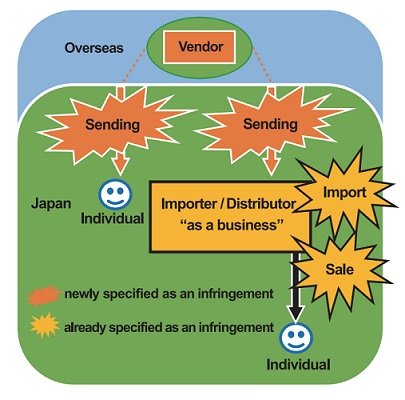ブログ
Best Practice against Importation of Counterfeit Goods under the New Trademark Act [Japan Trademark & Design Update]
2021.08.13
Best Practice against Importation of Counterfeit Goods under the New Trademark Act [Japan Trademark & Design Update]
https://www.tmi.gr.jp/uploads/2021/07/26/jptu_issue18.pdf#page=3
Introduction
May 21 saw the promulgation of the amended Trademark Act, which newly specifies an overseas vendor's act of sending goods to Japan as an act of "importation.” Therefore, upon the amended Trademark Act coming into force, which is supposed to be within one and a half years from the promulgation, if foreign suppliers directly send counterfeit goods to individuals in Japan, such act will constitute trademark infringement.
This additional definition of importation will have a strong impact on border control by Japan Customs and lead to the prevention of counterfeit goods from entering the Japanese market.
Background of Regulating Cross-Border Transactions of Counterfeit Goods
The Japanese market has been suffering from large numbers of trademark infringing products (especially counterfeit goods) such as bags, clothing, shoes, cell phones and cell phone accessories being imported to Japan. The best practice against imported counterfeit goods involves Japan Customs' border control, which enforces measures against goods that are infringing upon intellectual property rights (“IPRs”). The imported infringing goods may be confiscated and destroyed by Customs under the Customs Law following certain “Identification Procedures,” wherein Customs renders a decision on whether or not the suspected goods are infringing upon IPRs. The Identification Procedures generally proceed more smoothly and in a timely manner than court procedures; however, in recent years, the effectiveness of this best practice has decreased with a rapid increase in the number of cases involving overseas vendors selling and sending a small number of counterfeit goods directly to individuals in Japan due to the development of e-commerce and the lowering of international shipping rates. In the Identification Procedures for such cases, some importers submit an opinion that they imported goods not for commercial use but for private use and are therefore not infringing upon other's trademark rights. In this regard, the Trademark Act requires that the use of a trademark be done "as a business" in order to constitute trademark infringement (Article 2(1) of the Trademark Act). Accordingly, the importing of counterfeit goods for private use is not considered as an act of trademark infringement. Due to such legal background, it has become difficult for Customs to rebut the importer’s claim of private use in its limited procedures and to enforce measures against such imported infringing goods at the border. As such, importation by traders disguised as private imports or vicarious services thereof have also been prevailing. These circumstances have seen a greatly increasing number of companies that sell genuine products suffering damage in the Japanese market, including loss of sales opportunities and damage to their brand and corporate image.
Amendment of Trademark Act
In response to the recent increase in cross-border trade and the influx of counterfeit goods in Japan, the amended Trademark Act was promulgated on May 21, 2021, to recognize that sending counterfeit goods to Japan by postal mail or otherwise is an infringement of trademark rights when those goods enter Japanese territory. Consequently, counterfeit goods will be successfully subject to enforcement at Customs since trademark infringement will be established regardless of whether the domestic importer imported “as a business” or for private use. An equivalent amendment to the Design Act was also enacted on the same date.
Conclusion
In light of the recent amendment, we highly recommend the owners of trademarks in Japan who have been suffering from the existence of counterfeit goods to file an Application for Suspension with Japan Customs, which is the procedure whereby IPR holders request Customs to initiate Identification Procedures in cases where Customs detects goods suspected of infringing upon their IPRs in imports or exports. Upon acceptance of the Application for Suspension, the rights and the method of identifying the infringing goods will become clearer for Customs, which will enable more effective border control. TMI Associates is pleased to offer our assistance in filing the Application and handling the subsequent proceedings based on our extensive knowledge and experience in the field.
Member
PROFILE

